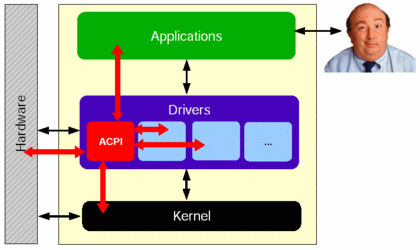|
|

|
AD: Upgrade ArcaOS to NeoWPS level
- Install original PNG icons drawed by designer, specialized at OS/2 adornation.
- Install eSchemes 2019 to change colors and buttons on desktop.
|
eComStation 2.0 Gets ACPI Support |
TITLE: eComStation 2.0 Gets ACPI Support
DATE: 2009-04-12 17:19:20
AUTHOR: eCo Software
As the performance of personal computers is increasing, so is power consumption and emitted heat. If the very first PCs needed no coolers, the modern ones can't function without multi-watt power supplies and effective heat abstraction. It is hard to imagine a computer without power management. At first, the external power management interface was granted through BIOS interruptions. The next step was APM (Advanced Power Management) specification. It existed for a while.
But as the computers and operating systems are becoming too complex, controlling the machine through BIOS interruptions becomes unpractical, as it decreases the performance. So the obsolete specifications such as Plug and Play, MPS and APM have been replaced by ACPI. ACPI (Advanced Configuration and Power Interface) is an open industry specification co-developed by Hewlett-Packard, Intel, Microsoft, Phoenix, and Toshiba. It defines every aspect of power management, even for 64-bit PC components.
Any modern computer (whether it's a server, workstation or a laptop) most likely fully complies with the ACPI specification. This makes ACPI support crucial for a contemporary operating system.
eComStation supports ACPI 3.0. To get ACPI support, the whole operating system had to undergo certain changes:
- the kernel has been updated and modified;
- device drivers have been updated, too;
- several utilities are now being developed.

The introduction of ACPI support caused dramatic eComStation update
What's Inside?
Inside the ACPI driver there's an "ACPI virtual machine", developed by Intel Corporation. Computer configuration data is represented in the object form (devices and methods applied to devices). By executing small programs within the virtual machine, we control the computer (devices as objects, events and response to them).

ACPI Manager utility provides graphical user interface to the ACPI virtual machine.
ACPI Manager lets us see the computer's devices and control them (on/off, state change, status query). For instance, you can switch off the coolers by executing "Off" method for the "Fan" type devices. Or find out the temperature ("Therm" devices).
ACPI driver: Initializes Your Computer
When eComStation with ACPI support boots, the following steps are performed:
- proper initialization of all devices: if a device is in the sleep mode, put it in the active mode; if a device needs an address and IRQ, it gets the resources required.
- multiprocessor systems launch: detecting the number of CPUs, gathering data for SMP-kernel, APIC (Advanced Programmable Interrupt Controller) controllers initialization.
ACPI driver: Multi-core Computers
Multi-core systems are the state of the art these days. With the help of ACPI, eComStation can get the most out of the home/office Intel Core Duo and AMD X2 based machines, not only multiprocessor servers.
ACPI driver: Power Management
Using ACPI and APM together is more flexible and brings more advantages than using APM alone. To use all ACPI functions, drivers and programs will have to call ACPI.PSD and ACPI32.DLL directly.
Main Power Management Functions:
- "Power" button pressing handling;
- power state change support;
- suspend/resume/hibernate support (for laptops as well);
- gathering data about coolers, temperature, laptop battery state;
- coolers noise level decrease;
- power saving policy setup, laptop battery life increase;
- power consumption decrease when machine is idling;
- throttling support: a "Turbo" button reincarnation, when the computer can run idle cycles (but now, the CPU has 8 states instead of 2).
Additional Info
ACPI.PSD can only be used with eComStation 2.0 and higher.
ACPI for eComStation
Comments: R.M. Klippstein 
2009-05-19 20:46:08 | Excellent article! I've downplayed the necessity of ACPI thinking it was only for Laptops! I now recognize the importance of its development and understand why its development was (and still is ) such a "bucket of worms" for the people developing it for eCs.
Thanks for "Keeping up the good work!" |
Comment this article.
|
 |

IBM OS/2 Warp
|





